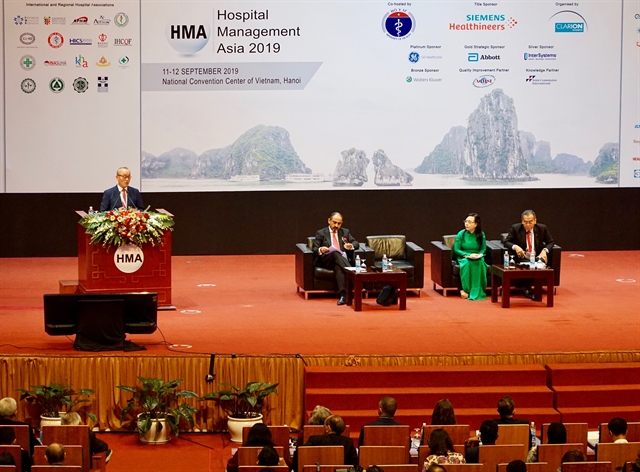 Society
Society

Nearly 1,100 hospital management and healthcare professionals from the Asia Pacific region attended Hospital Management Asia 2019, an annual event for Asian healthcare leaders, which opened in Hà Nội on Wednesday.

|
| A panel discussion at the Hospital Management Asia 2019, the annual event for Asian healthcare leaders, which opened in Hà Nội on Wednesday. — VNS Photo Thanh Hải |
HÀ NỘI — Nearly 1,100 hospital management and healthcare professionals from the Asia Pacific region attended Hospital Management Asia 2019, an annual event for Asian healthcare leaders, which opened in Hà Nội on Wednesday.
The annual event is an opportunity for local and international health experts and policy makers to exchange ideas and insights on evolving business models, innovative technologies and improvements on the management of healthcare systems.
"The Government of Việt Nam has developed an action plan to improve healthcare in Việt Nam on all fronts. One of the best opportunities to further our mission towards reform lies at Hospital Management Asia, with several stellar case studies from across the region," said Vietnamese health minister Nguyễn Thị Kim Tiến.
"Healthcare is accelerating exponentially in Asia and I am excited to be part of the movement to bring hospitals, investors and solution providers together to help our hospitals provide better service and the best patient outcomes possible," said Tiến.
Minister Tiến said that in recent years, the health ministry has implemented a health reform programme with a goal towards Universal Health Coverage (UHC), in which health service quality has played an important role in ensuring safety for patients and people. To protect the health of 96 million people, Việt Nam always follows the "patient-centred" motto – providing safe, quality services and satisfying patients.
”To improve the quality of medical services, we have developed hospital quality, surgical and test quality criteria. We also launched the Satellite Hospital Programme to transfer medical technologies to lower-level hospitals to improve their professional quality, reduce over-capacity and overcrowding at higher levels,” stressed Tiến.
She added that the health sector also implemented various measures to improve patient satisfaction such as establishing hotlines, increasing health insurance coverage, training health worker and applying IT in hospital and patient management.
During the two-day event, participants will focus discussions on topics such as the latest technologies for healthcare, cost reduction and patient safety to increase efficiency and improve patient outcomes. The conference will also discuss Healthcare 4.0, investments in hospitals and healthcare across Asia, and winning the war for healthcare talent, among others.
This year, the conference will feature five main streams, including a new one for C-level leaders, which will discuss financial sustainability through investments, the impact of public policy for hospital services and how to address the challenges in the implementation of value-based care. Other streams include Safety, Quality & Accreditation; Patient Care & Engagement; Talent Management; and Healthcare 4.0.
Running alongside the conference is the Asian Hospital Management Awards that recognise and honour hospitals in Asia Pacific that implement best practices. All projects submitted by Vietnamese hospitals will also be eligible for the 'Most Improved Local Hospital' category – a special award for entries by Vietnamese hospitals.
According to the health ministry, after 5 years implementation, the programme has built and formed 23 nuclear hospitals and 138 satellite hospitals nationwide. Ten specialties were invested and prioritised for development, including oncology, surgical trauma, cardiology, obstetrics, paediatrics, endocrinology, neurology, clinical haematology, emergency resuscitation and poison control.
Initial results showed that it has gradually reduced the overload of higher-level hospitals, especially in HCM City and Hà Nội, contributing to improving the service delivery capacity of lower-level hospitals, strengthening people's confidence in the grassroots health system, reducing referral rates, and allowing people to receive technical services and safe quality right at their localities.
At the event, a Memorandum of Understanding on healthcare and treatment collaboration was signed between three Vietnamese private hospitals, including Hùng Vương General Hospital, Quang Khởi General Hospital and Central Otolaryngology Hospital, and three Malaysian private hospitals, including Mahkota Medical Center, Subang Jaya Medical Center and Sunway Medical Center.
This collaboration will allow patients after receiving initial consultation and diagnosis by doctors at the three Vietnamese hospitals to seek second professional advice from three Malaysian health units, if required. Three Vietnamese hospitals will continue to monitor and treat these patients after returning from Malaysia.
“The co-operation of Malaysian health with three Vietnamese hospitals is an important milestone, emphasising the trust of our partners and foreign stakeholders in the quality healthcare service of Malaysia,” said Sherene Azli, CEO of Malaysia Healthcare Travel Council (MHTC).
In 2018, Malaysia Healthcare served more than 1.2 million visitors coming to the country for healthcare purposes, an increase of more than 14 per cent compared to 2017. — VNS




